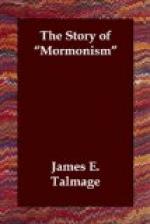Joseph Smith had been more than the ecclesiastical leader; his presence and personality had been ever powerful as a stimulus to the hearts of the people; none knew his personal power better than the members of his own flock, unless indeed it were the wolves who were ever seeking to harry the fold. It had been the boast of anti-"Mormons” that with Joseph Smith removed, the Church would crumble to pieces of itself. In the personality of their leader, it was thought, lay the secret of the people’s strength; and like the Philistines, the enemy struck at the supposed bond of power. Terrible as was the blow of the fearful fatality, the Church soon emerged from its despairing state of poignant grief, and rose mightier than before. It is the faith of this people that while the work of God on earth is carried on by men, yet mortals are but instruments in the Creator’s hands for the accomplishment of divine purposes. The death of the president disorganized the First Presidency of the Church; but the official body next in authority, the Council of the Twelve, stepped to the front, and the progress of the Church was unhindered. The work of the ministry was not arrested; the people paused but long enough to bury their dead and clear their eyes from the blinding tears that fell.
Let us take a retrospective glance at this unusual man. Though his opponents deny him the divine commission with which his friends believe he was charged, they all, friends and foes alike, admit that he was a great man. Through the testimony of his life’s work and the sanctifying seal of his martyrdom, thousands have come to acknowledge him all that he professed to be—a messenger from God to the people. He is not without admirers among men who deny the truth of his principles and the faith of his people.
A historical writer of the time, Josiah Quincy, a few weeks after the martyrdom, wrote:
It is by no means improbable that some future text book for the use of generations yet unborn, will contain a question something like this: “What historical American of the nineteenth century has exerted the most powerful influence upon the destinies of his countrymen?” And it is by no means impossible that the answer to that interrogatory may be thus written—“Joseph Smith, the Mormon Prophet.” And the reply, absurd as it doubtless seems to most men now living, may be an obvious commonplace to their descendants. History deals in surprises and paradoxes quite as startling as this. A man who established a religion in this age of free debate, who was and is today accepted by hundreds of thousands as a direct emissary from the Most High—such a rare human being is not to be disposed of by pelting his memory with unsavory epithets. * * * The most vital questions Americans are asking each other today, have to deal with this man and what he has left us. * * * Joseph Smith, claiming to be an inspired teacher, faced adversity such as few men have been called to meet,




